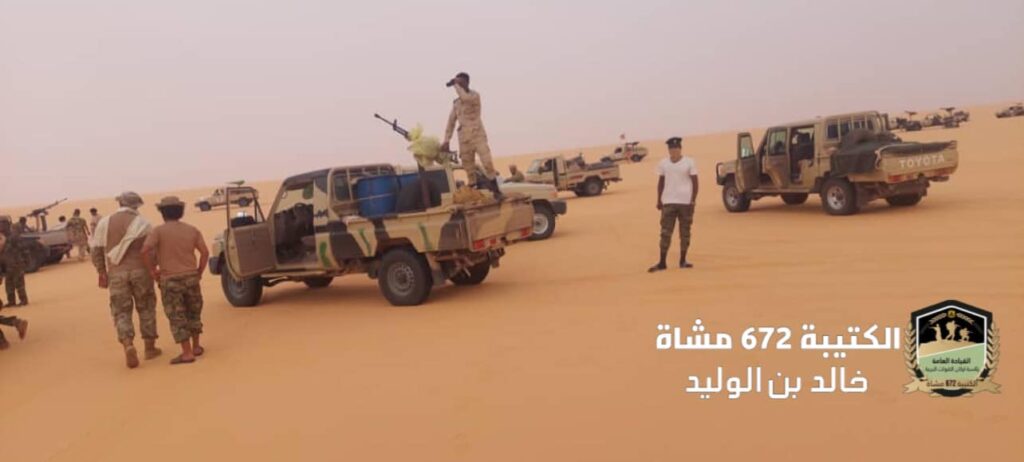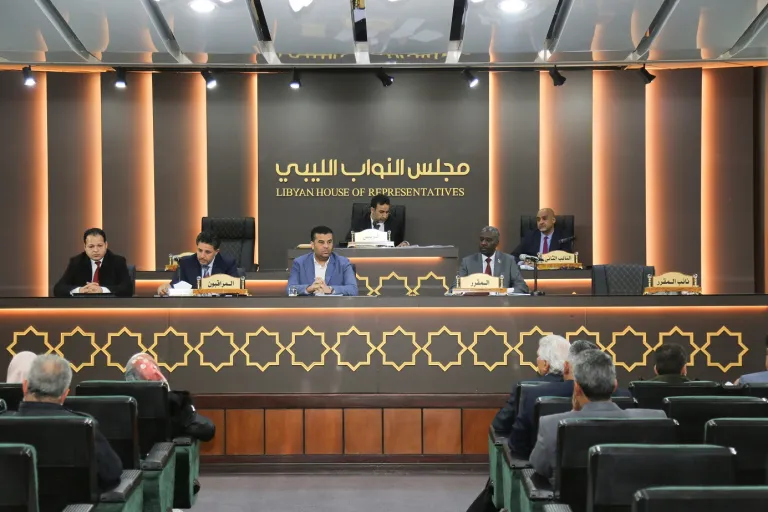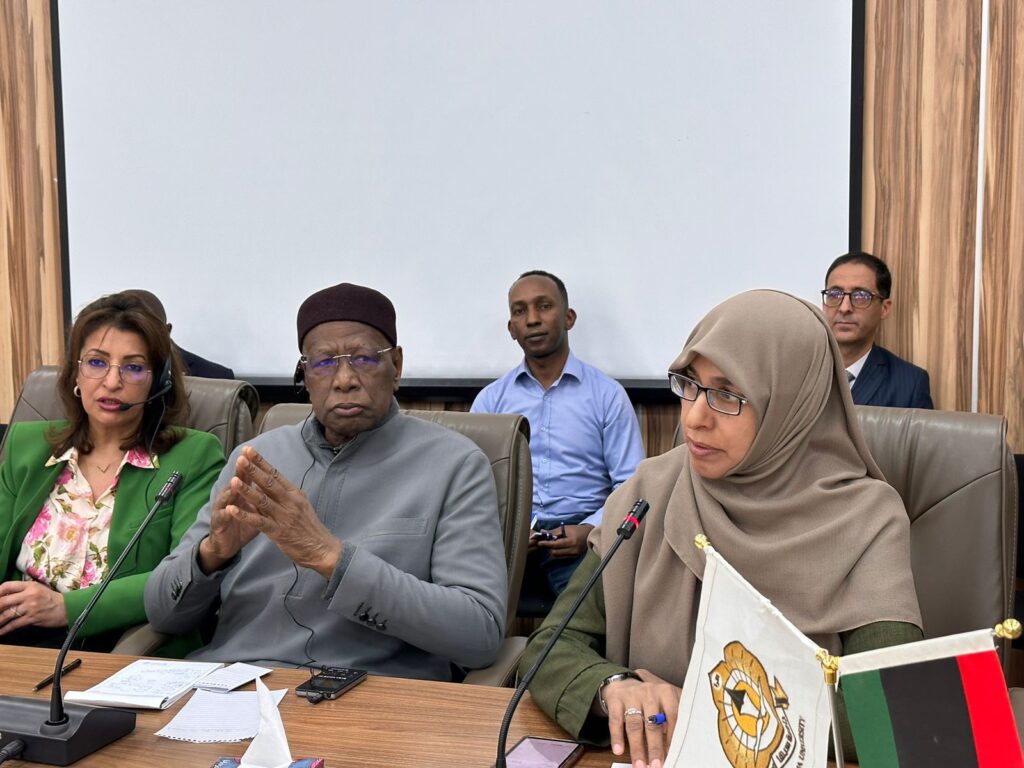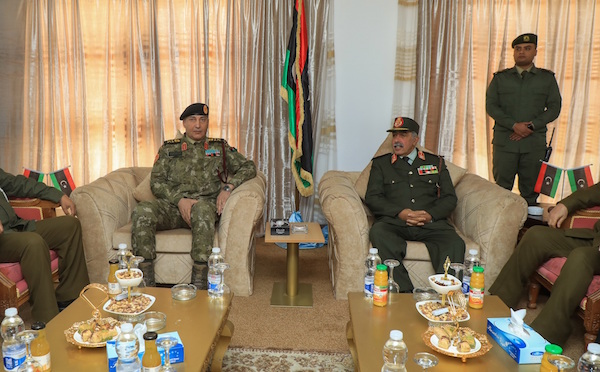NATIONAL SECURITY ISSUES
- The Libyan National Army sent military reinforcements to the southern border, which extends over an area of more than 1,500 kilometers, and its patrols roamed the desert in order to confront smuggling and organized crime activities. The past two days witnessed intense activity of army patrols, especially the “El Salvador Triangle” between Libya, Niger, and Algeria, which is classified as one of the most dangerous centers of organized crime in Africa.
- The United Nations High Commissioner for Refugees (UNHCR) has revealed that throughout 2023, Libyan authorities intercepted approximately 4,200 irregular migrants in the Mediterranean. The UNHCR provided a periodic update on the situation, reporting that an estimated 4,261 migrants currently reside in immigration detention centers nationwide.

- Seven migrants died and 19 others were injured following a road accident that took place on Sunday, April 9 in Barak Shati city, in the south west of Libya. This was announced yesterday by the city hospital on its Facebook page, stating that, on Sunday, 26 migrants of sub-Saharan nationality were transported to the hospital following a road accident, without specifying the place of the accident.

- The General Command of the Libyan National Army (LNA) deployed a joint force to secure the southern regions, which included Brigade 73, Brigade 128, Al-Waw company, and Battalion 672, where that force was divided into four groups that take over several areas.

- The Italian coastguard is carrying out operations to rescue two boats carrying a total of 1,200 people, it said, after a surge in the number of migrants crossing the Mediterranean from North Africa over the weekend, Reuters reports on Monday, April 10. One of the boats, which is carrying 400 people and is in the Ionian Sea off the coast of Calabria, southern Italy, had previously been sighted in Maltese waters.

NATIONAL POLITICS AND SOCIAL ISSUES
- Parliament Member Issam Al-Jehani expressed his concerns about the upcoming electoral process in Libya. According to Al-Jehani, the division of the executive authority will likely fail the elections. He emphasized that if Libya wants to hold successful elections, it needs to first decide on the file of the executive authority and determine who will supervise it.
- The Libyan parliament has approved a new law regulating the operations of the General Intelligence Service. The law was approved by the House of Representatives and referred to the head of the General Intelligence Service to put it into practice. The new law goes by the number 8 of 2023 and grants the head of the agency the status of an advisor to the head of the state with regard to the country’s security and safety. Additionally, the head of the agency would be directly accountable to the head of state.

- Libyan Prime Minister-designate, Fathi Bashagha, has said that it is “too early” to talk about running for the presidential elections in Libya. These elections are expected to take place if the House of Representatives and the High Council of State reach an agreement on the election laws.
- UN Envoy to Libya, Abdoulaye Bathily, briefed chairman of Presidential Council, Mohamed Al-Menfi, on his latest meetings with Libyan stakeholders in Benghazi and Sabha. The pair also discussed the outcomes of Bathily’s trip to Chad and Sudan to garner support for Libya’s peace process, according to a statement by the council.
- UN Envoy to Libya, Abdoulaye Bathily, said that people in southern Libya should be “empowered economically and socially to enjoy their citizenship fully.” Bathily made his remarks after meeting representatives of local municipalities, civil society, women, youth groups and student unions in Sabha.

INTERNATIONAL RELATIONS
- Head of the High National Elections Commission (HNEC), Emad Al-Sayeh, met with a delegation from the UK Embassy in Libya led by Ambassador Caroline Hurndall. According to a statement by the HNEC, the meeting focused on the electoral process’s recent developments and the commission’s preparations for it. The two parties also discussed ways to support proposals and ventures that can ensure the success of the elections by international standards.
- The Chiefs of Staff of the army in western and eastern Libya, Muhammad al-Haddad and Abd al-Razzaq al-Naduri, are set to meet in Benghazi this evening in what has been deemed an important meeting. It is expected that the meeting will lead to the announcement of the formation of a joint force tasked with securing the upcoming elections and the borders of the country and unifying the military establishment.
- A delegation from the Chief of Staff in Tripoli led by Lieutenant-General Muhammad al-Haddad is currently will head today to Benghazi to hold talks with a delegation from the Chief of Staff of the Libyan National Army. The Libyan Army delegation is headed by Lieutenant General Abdel-Razek al-Nadhouri. The purpose of the meeting is to discuss ways to complete the unification of the military institution and its affiliated departments, as well as to form a joint force.
























